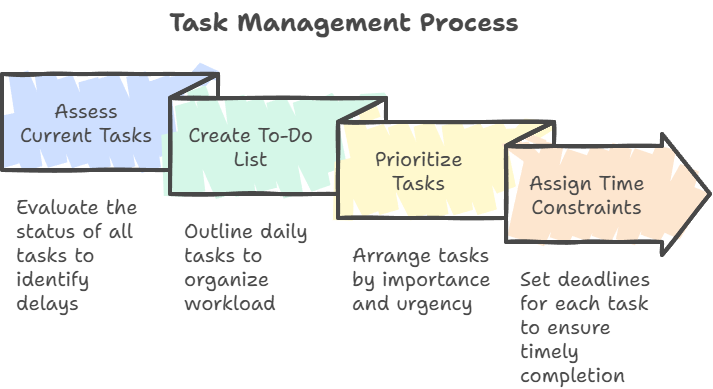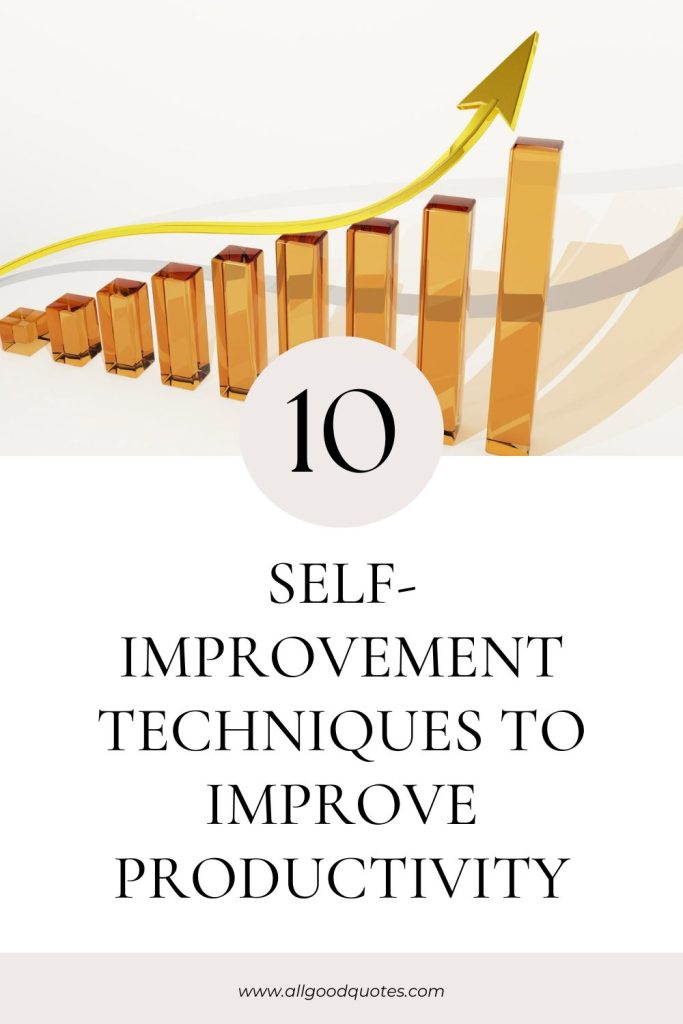There is always the option of doing a task better than previously, no matter how competent or productive you are. Keeping an eye on improving your skill set and finding new ways to learn is the first step toward improving productivity of yourself. It not only improves your ability to do your job but also offers possible chances for professional advancement.
Given the need of continuous and never-ending self-improvement, we’ve compiled a list of work management suggestions to increase work performance that will undoubtedly help you improve your performance and worth in the workplace.
10 Self-Improvement Techniques to improve productivity
1. Limit distractions
Do you know that when an employee is interrupted, they take longer to complete a task. They often make twice as many mistakes, and feel twice as anxious.
It’s crucial to avoid these kind of interruptions because they have a negative impact on your concentration and productivity, which causes activities and projects to be delayed.
- Surround yourself at work with productive individuals.
- To keep track of how long it takes to do certain jobs, use a time tracking application.
- Take quick breaks to rest and refresh.
- If you’re working from home, locate your desk in a peaceful area of the house.
- If you’re working in a noisy workplace, consider using noise-canceling headphones.
2. Plan and prioritize tasks
The best technique to increase work effectiveness under pressure is probably to plan and prioritize tasks. There’s a likelihood that many people waste a lot of time on unimportant or low-priority jobs. Due to the lack of time they have to devote to urgent or high-priority tasks, task completion and project delivery are further delayed.
- Assess the current status of each of your tasks to identify any that are behind schedule.
- Make a to-do list to outline all you need to accomplish each day.
- Put the most important or urgent tasks first.
- Assign jobs time constraints.

3. Allocate tasks whenever possible
Allocating tasks to subordinates is a tried-and-true way for senior members of the organisation to boost productivity while still having faith in them to do the work well. One of the most crucial managerial abilities is the ability to delegate effectively, which allows people to handle less work and concentrate on other, more crucial tasks for a project.
- Recognize your employee’s skills and give them jobs that play to those.
- Determine which duties you can outsource and which need your skills.
- Use a potent task management programme.
- Assign both power and accountability.
- Be involved but refrain from micromanaging.
- Be receptive to novel approaches to carrying out a task.

4. Communicate
Your ability to communicate at work can make or destroy you. Maintaining prompt, timely communication is crucial because it clarifies what has to be done and how to achieve it while keeping everyone informed of all project-related activities. Effective communication prevents the omission of crucial information and guarantees the timely completion of tasks and projects in accordance with predetermined quality standards.
- Be sure to communicate your team’s expectations and goals clearly.
- Arrange regular one-on-one conversations.
- Praise publicly while criticising privately.
- Address any disagreements or conflicts right away to avoid more commotion.
- Use communication tools like real-time notifications, discussions, and instant chat to deliver the appropriate information at the appropriate moment.
Also Read:10 Golden Words for Life
5. Improve your time management
Do you frequently find yourself rushing to meet deadlines? Are you bringing your work home merely to prevent delays in project delivery? If so, you should develop your time-management abilities to complete daily, weekly, and monthly tasks efficiently. Additionally, you must ensure that you are spending your important work time on the appropriate duties rather than squandering it on other activities like socialising, procrastinating, using a mobile device, etc.
- Use a time monitoring tool to keep track of your daily activities.
- Establish deadlines for certain tasks.
- Refrain from multitasking.
- Prioritize key tasks.
- Stop wasting time at work;
- Take frequent, brief breaks.
6. Set clear milestones
Setting specific goals is crucial in both the personal and professional spheres. As humans, we have a tendency to aim for the stars, and this is reflected in the objectives we establish. Now, it’s acceptable to be a little bold, but it’s far preferable to think clearly and be practical when it comes to “goals.”
- Pay attention to the due date.
- Add all of the crucial dates to an online calendar.
- Develop your project evaluation capabilities.
- View each accomplishment as a teaching opportunity.
7. Set clear and achievable goals
Realistic goals must be made in order to increase performance at work. This means that after assessing your strengths and constraints at work, you should develop clear and attainable goals. You may wish to rule the productivity world, but only after taking into account how much you can get done in a single workday. Setting smaller goals will help you stay on target.
- Set SMART objectives (Specific, Measurable, Attainable, Relevant, Time-bound).
- Instead of daydreaming about your objectives, write them down to give them a more concrete appearance.
- List your objectives in priority order (write the main goal at the top followed by smaller goals).
- Make an action plan to assist you in achieving these objectives.
- Be responsible for your actions.
8. Avoid multitasking
While it is simple to handle several jobs at once, switching between them will just serve to divert your attention. There are some complex jobs that require our full concentration, yet multitasking increases the likelihood of mistakes in our work and interferes with our efforts to increase productivity.
- Decide to focus on one project at a time.
- Make a to-do list for each day.
- Be explicit that you won’t accept any additional work while concentrating on a specific task.
- Organize your workspace. Maintain order and organisation.
- When your productivity is at its highest, tackle your most difficult tasks.
9. Finish what you start
Another thing that could have an impact on your performance and productivity at work is procrastination. Do you recall how frequently you’ve begun something and then stopped working on it? It’s time to change if you experience this frequently. Don’t leave anything in between on a regular basis. If you’ve started a task or project, make sure it is completed as perfectly as possible.
- Estimate how long the task will take.
- Congratulate yourself after you finish a task or project satisfactorily.
- Do a task when you are most productive that day.
- Avoid working on numerous projects at once.
10. Ask for constructive feedback
work, and asking your reporting manager for feedback is a fantastic place to start. Even if you are the best at what you do, you can always get better. It’s interesting how some flaws we may not be aware of yet others are. Additionally, it exhibits your capacity to develop your knowledge and abilities while assisting the organization’s advancement at every level.
- Select the appropriate moment to request feedback.
- Arrange a meeting time.
- Make a list of inquiries you want to make.
- Take notes during the discussion of the feedback.
- Gain knowledge on what you need do to improve from the.
30 Quotes to Improve Productivity
Here are some quotes that can help you with self-improvement techniques to improve productivity:
“You don’t have to be great to start, but you have to start to be great.”
Zig Ziglar
“The key to success is to focus on goals, not obstacles.”
Unknown
“The way to get started is to quit talking and begin doing.”
Walt Disney
“Success is not the result of spontaneous combustion. You must set yourself on fire.”
Reggie Leach
“The most effective way to do it is to do it.”
Amelia Earhart
“If you want to make your dreams come true, the first thing you have to do is wake up.”
J.M. Power
“The most valuable commodity I know of is information.”
Gordon Gekko
“You can’t manage time; you can only manage yourself.”
Peter Drucker
“The more you know yourself, the more clarity there is. Self-knowledge has no end.”
Jiddu Krishnamurti
“You don’t have to be a genius or a visionary or even a college graduate to be successful. You just need a framework and a dream.”
Michael Dell
“The most effective way to do something is to do it with consistency.”
Unknown
“Invest in yourself. Your career is the engine of your wealth.”
Paul Clitheroe
“Productivity is being able to do things that you were never able to do before.”
Franz Kafka
“Productivity is never an accident. It is always the result of a commitment to excellence, intelligent planning, and focused effort.”
Paul J. Meyer
“Your time is precious, don’t waste it on someone who doesn’t realize your worth.”
Unknown
“To be disciplined is to follow in a good way. To be self-disciplined is to follow in a better way.”
Corita Kent
“Success is the sum of small efforts, repeated day in and day out.”
Robert Collier
“Don’t watch the clock; do what it does. Keep going.”
Sam Levenson
“You can’t build a reputation on what you are going to do.”
Henry Ford
“The more you eliminate the inefficient use of information, the better it is for productivity.”
Mitchell Kapor
“Time is what we want most, but what we use worst.”
William Penn
“A goal without a plan is just a wish.”
Antoine de Saint-Exupéry
“Don’t count the days, make the days count.”
Muhammad Ali
“When you find an idea that you just can’t stop thinking about, that’s probably a good one to pursue.”
Josh James
“Productivity is not just about getting things done, it’s about getting the right things done.”
Unknown
“What you get by achieving your goals is not as important as what you become by achieving your goals.”
Zig Ziglar
“The greatest glory in living lies not in never falling, but in rising every time we fall.”
Nelson Mandela
“Don’t let yesterday take up too much of today.”
Will Rogers
“The only way to do great work is to love what you do.”
Steve Jobs
“If you want to live a happy life, tie it to a goal, not to people or things.”
Albert Einstein
Conclusion
Remember, productivity is not about doing more in less time, but about doing the right things at the right time. These quotes can help you with self-improvement techniques to prioritize, focus, and manage your time effectively so that you can achieve your goals and live a more fulfilling life.

